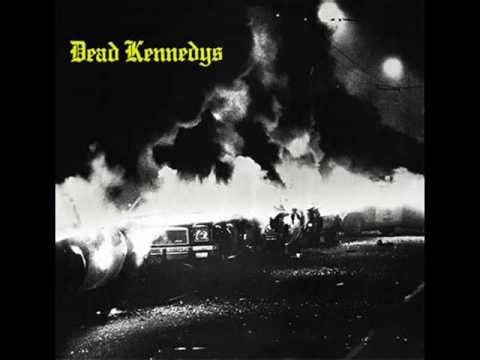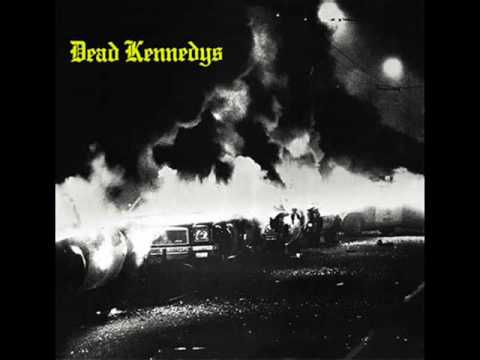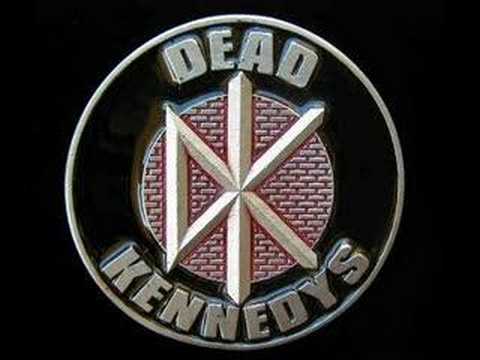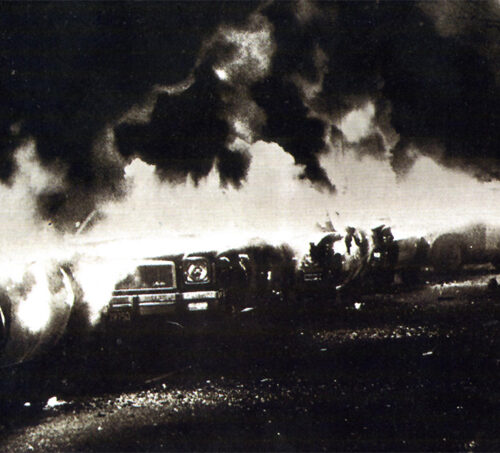The punk rock movement was a bandwagon that was driven fast and didn’t wait for stragglers to catch up. By 1978, it was rolling on to new musical territories and carrying many of the genre’s key figures with it. But, in California, a crop of younger men and women were refusing to let it just pass them by; the music they created would eventually become known as ‘hardcore punk’. Dead Kennedys were one of the finest bands to ever play beneath the hardcore banner, but before this their debut album, Fresh Fruit For Rotting Vegetables was released 40 years ago this month. Eric ‘Jello Biafra’ Boucher and ‘East Bay’ Ray Pepperell were the first to meet, in mid-1978.
Jello had aligned himself with left-wing causes like the Vietnam Peace movement and the Chicago 7 before becoming Dead Kennedys’ voice, both as singer and lyricist. Before he put out an ad in a San Francisco underground shop Aquarius for musicians to form a punk band, Ray was already a practised guitarist and bassist, Klaus Fluoride (Geoffrey Lyall), a fan of others like Muddy Waters and second guitarist Carlos ‘6025’ Cadona (with original drummer Ted (Bruce Slesinger) completed the original line-up). The sound of the West Coast hardcore scene they joined has sometimes been stereotyped as regimentally fast, loud and simple, the uniform product of gangs of impatient upstart youths chewing away at punk’s already thin margin of musical subtlety. If this was true (even if), Dead Kennedys would be the one great shining exception.
‘Freewheeling’ might be the word for Fresh Fruit, its fast tempo delivering a screed of absurd images, invective, harangues and daring stabs of melody. East Bay Ray’s guitar playing was heavily influenced by the musically elegant early-60s ‘surf’ groups, like Dick Dale and the Del-Tones, whose instrumentals were composed with the adrenaline-gushing hazards of the West Coast surf lifestyle in mind. (He would deny these influences himself, citing Syd Barrett and Elvis axeman, Scotty Moore.) This style gelled perfectly with Jello’s lyrical vision of California, c1979, a frothy surface of materialism and conspicuous consumption and an undercurrent of trash, violence, greed and political corruption. His voice is a nimble thing, his phrasing seems to cartwheel through some verses and plough at high velocity through others.
No, hardcore was more the word for their ideological resoluteness than their musical style. The hardcore scene, not content to let last year’s gig reviews line today’s hamster cages, clung to the transformative power of punk over their lives, which was greater than the confines of headlines and scandal. They continued to melt down yesterday’s idols in order to shape and mould their own
futures.
While Jello derides the armed forces in ‘When Ya Get Drafted’, the student radicals with whom he opposed militarism in his younger days don’t get a free pass either, and their complacency is mocked with equal savagery in ‘Holiday in Cambodia’. In ‘Kill the Poor’, he imagines the Cold War nuclear cowboys turning the neutron bomb against undesirable elements in America – “the jobless millions whisked away” – to make way for commercial redevelopment and luxury homes.
The spectacular thing about Fresh Fruit For Rotting Vegetables, is that, unlike so much other protest music, the album never compromises musical flair and excitement to push its message. One song, ‘Chemical Warfare’, begins with a typically Biafra-esque fantasy of open class conflict, waged with stolen mustard gas, alongside Ray’s galloping guitar riff, and moves on to what might be hardcore punk’s answer to ‘Bohemian Rhapsody'(in only half the time) – a middle-eight of queasy faux-fairground music, followed by a lurid re-enactment of a toxic gas attack on a country club, backed up by a ‘choir’ featuring the likes of ‘Norm’ (actually the band’s cat) and ‘Barbara Hellbent’, and replete with wailing, screaming and howls for mercy.
Away from the microphone Jello could be equally uncompromising. In 1979, for example, he won a nomination for San Francisco’s mayoral election, and used his candidate’s allowance of TV air-time to offer his constituency the chance to elect their own police officers and re-employ redundant public-sector workers as licensed beggars. His public image in interviews was not a duplicate of classic nihilist/loser punk poses, but intelligent and engaged, if a little bumptious.
Imagine it’s 1979 and you’re a teenager trailing a rumour to a San Francisco club. You heard about how the Pistols died live on stage last year. This band is very much alive. They rip into ‘California Über Alles’. Although you’ve never much been bothered about politicians, the instant infamy this song bestows on your own state’s Governor Jerry Brown somehow seems impressive.
The singer’s lost his shirt, and control over the movements of his arms and face, apparently, but off-stage the four of them would blend easily into the usual Friday night crowd.
Though Fresh Fruit For Rotting Vegetables has sold over a million copies, Jello Biafra was just not a punk icon in the same way as Sid Vicious and Joey Ramone were. The making of this first wave of punks was mostly down to serendipitous encounters: the gatherings at CBGBs on the Bowery; Malcolm McLaren’s chance meeting with John Lydon, and Bernard Rhodes’ with Joe Strummer.
But the idea of punk itself, unlike Dada or the Lindy Hop, has somehow slipped free of the context of this history, so lovingly recorded in dozens of the paperbacks in bookshop music
sections. A million bands have taken it from the original punks over the last 40 years and applied it to their own specific time and place, as though it was their birthright. The anniversary of Dead Kennedys’ first album is important because they were one of the first to do so, and did it in such an
uncompromising, swashbuckling fashion.






